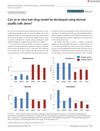 May 2024 in “Journal of cosmetic dermatology”
May 2024 in “Journal of cosmetic dermatology” Heat-treated Limosilactobacillus fermentum with menthol, salicylic acid, and panthenol promotes hair growth and balances scalp microbiome in people with androgenetic alopecia.
 December 2023 in “JEADV Clinical Practice”
December 2023 in “JEADV Clinical Practice” A woman's hair grew back with baricitinib treatment, but she developed a temporary hairy tongue that was treated with regular tongue brushing.
 January 2022 in “International Journal of Medical Sciences”
January 2022 in “International Journal of Medical Sciences” Cedrol may be an effective treatment for colorectal cancer.
[object Object]  1 citations,
July 2023 in “Frontiers in Immunology”
1 citations,
July 2023 in “Frontiers in Immunology” Oxidative stress and immune dysfunction are linked to both Hashimoto's thyroiditis and polycystic ovary syndrome, with diet and specific treatments important for managing these conditions.
 9 citations,
May 2015 in “Cardiology Clinics”
9 citations,
May 2015 in “Cardiology Clinics” The conclusion is that managing cholesterol is important for women, especially during pregnancy, breastfeeding, and with PCOS, and involves regular screening and careful treatment choices.
 February 2024 in “Endocrinology and Disorders”
February 2024 in “Endocrinology and Disorders” Balanced hormones are crucial for women's health, and can be managed with lifestyle changes or hormone therapy if needed.
Green tea compound EGCG could potentially treat colorectal cancer by removing iron and causing stress in cancer cells leading to their death.
 3 citations,
January 2007 in “Elsevier eBooks”
3 citations,
January 2007 in “Elsevier eBooks” The document concludes that individualized treatment and lifestyle changes are important for managing menopause symptoms and health risks.
 August 2023 in “Physician's journal of medicine”
August 2023 in “Physician's journal of medicine” Hashimoto thyroiditis is an autoimmune disease that can lead to an underactive thyroid and is treated with medication and sometimes diet changes or surgery.
 3 citations,
February 2016 in “Endocrinology and Metabolism Clinics of North America”
3 citations,
February 2016 in “Endocrinology and Metabolism Clinics of North America” Manage women's cholesterol with diet, exercise, and careful treatment choices, especially during pregnancy, PCOS, and menopause.
 9 citations,
April 2015 in “Dermatologic Therapy”
9 citations,
April 2015 in “Dermatologic Therapy” Hormonal therapies, like flutamide and cyproterone acetate, are safe and effective for treating adult women's acne, especially those with hormone imbalance or resistant acne.
 2 citations,
January 2011 in “Andrologia”
2 citations,
January 2011 in “Andrologia” Flutamide and a new synthetic steroid affected brain and prostate chemicals and showed potential for treating androgen-related conditions and epilepsy.
 108 citations,
December 2003 in “Clinical breast cancer”
108 citations,
December 2003 in “Clinical breast cancer” PLD is an effective and safer alternative for treating breast cancer.
 64 citations,
March 2017 in “Nature communications”
64 citations,
March 2017 in “Nature communications” Researchers found 63 genes linked to male-pattern baldness, which could help in understanding its biology and developing new treatments.
18 citations,
September 2021 in “Journal of Neuroendocrinology” Neurosteroids can influence behavior by modulating brain inhibition, with potential for treating psychiatric disorders.
 3 citations,
February 2021 in “Experimental dermatology”
3 citations,
February 2021 in “Experimental dermatology” Dermal papilla microtissues could be useful for initial hair growth drug testing.
 57 citations,
May 2014 in “Molecular Phylogenetics and Evolution”
57 citations,
May 2014 in “Molecular Phylogenetics and Evolution” The research found how GPCR Class A Rhodopsin receptors are related and suggested possible substances they interact with.
 5 citations,
October 2018 in “Journal of Clinical Laboratory Analysis”
5 citations,
October 2018 in “Journal of Clinical Laboratory Analysis” Women with PCOS who have high male hormone levels often also have insulin resistance.
 2 citations,
November 2008 in “Medical Hypotheses”
2 citations,
November 2008 in “Medical Hypotheses” VEGF and its receptor might cause hair loss.

Hair analysis can help identify specific minerals and amino acids linked to various diseases.
 5 citations,
November 2014 in “Journal of Pharmaceutical Sciences”
5 citations,
November 2014 in “Journal of Pharmaceutical Sciences”  2 citations,
October 2021 in “Exploration of targeted anti-tumor therapy”
2 citations,
October 2021 in “Exploration of targeted anti-tumor therapy” Breast cancer hormone therapy can cause hair loss, which can be treated with daily applications of specific topical solutions like minoxidil and hydrocortisone butyrate.
[object Object]  March 2017 in “The American Journal of Cosmetic Surgery”
March 2017 in “The American Journal of Cosmetic Surgery” Transplanted hair follicles can resist hair loss from an autoimmune condition better than natural hair.
 June 2008 in “Experimental dermatology”
June 2008 in “Experimental dermatology” Melatonin protects skin and hair from damage and stress by acting as an antioxidant and influencing cell growth.
 127 citations,
June 2008 in “British Journal of Clinical Pharmacology”
127 citations,
June 2008 in “British Journal of Clinical Pharmacology” Low doses of some substances can be beneficial, while high doses can be harmful or toxic.
 86 citations,
October 2017 in “Clinics in Dermatology”
86 citations,
October 2017 in “Clinics in Dermatology” Older adults have a high rate of skin cancers like basal cell carcinoma and melanoma, mainly due to UV exposure and age.
 8 citations,
February 2009 in “Current Women's Health Reviews”
8 citations,
February 2009 in “Current Women's Health Reviews” Testosterone treatment can improve sexual function and bone density in women but may have adverse effects and requires more research on safety and guidelines.

Female rats showed more panic-related behavior than males, influenced by hormonal cycles and certain drugs.
 103 citations,
June 2007 in “Endocrinology and Metabolism Clinics of North America”
103 citations,
June 2007 in “Endocrinology and Metabolism Clinics of North America” Male pattern hair loss is genetic and influenced by hormones, with treatments like minoxidil and surgery available.
 24 citations,
August 2018 in “Journal of Ayurvedic and herbal medicine”
24 citations,
August 2018 in “Journal of Ayurvedic and herbal medicine” Hibiscus rosa-sinensis may help treat various health issues and promote hair growth, but more research is needed for safety.



























